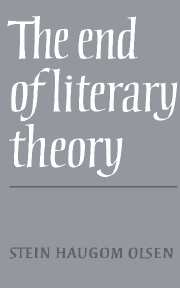Book contents
- Frontmatter
- Contents
- Preface
- Literary aesthetics and literary practice
- Interpretation and intention
- Authorial intention
- Text and meaning
- The ‘meaning’ of a literary work
- Defining a literary work
- What is poetics?
- On unilluminating criticism
- Criticism and appreciation
- Value-judgements in criticism
- Literature, fiction, and reality. A problematic relationship
- Thematic concepts: where philosophy meets literature
- Literary theory and literary aesthetics
- Notes
- Bibliography
- Index
Value-judgements in criticism
Published online by Cambridge University Press: 05 November 2011
- Frontmatter
- Contents
- Preface
- Literary aesthetics and literary practice
- Interpretation and intention
- Authorial intention
- Text and meaning
- The ‘meaning’ of a literary work
- Defining a literary work
- What is poetics?
- On unilluminating criticism
- Criticism and appreciation
- Value-judgements in criticism
- Literature, fiction, and reality. A problematic relationship
- Thematic concepts: where philosophy meets literature
- Literary theory and literary aesthetics
- Notes
- Bibliography
- Index
Summary
ONE
Consider the following comments on John Lydgate's poetry:
Lydgate's limited poetic gifts show most clearly in his diction and the use he makes of words and phrases. An examination of Chaucer's diction has already shown us how we must look at the medieval poet's use of language, and in Lydgate even more than in Chaucer we shall find that words have but a limited associative value, and are not rich in ‘overtones’. Phrases like ‘her sonnysh hair’, or the ‘restless stone’ of Sisyphus, are rare; Lydgate uses them in the strict sense of the language from which he takes them – generally French or Latin. He extends our vocabulary of abstract terms – dismay, infallible, solicitude, tolerance – but he does little to use language in an imaginative or stimulating fashion. This comparative ‘deadness’ of language is to be found everywhere in Lydgate: he had little feeling for the poetical value of words. The mot juste meant nothing to him. Indeed the most outstanding feature of his style is repetition – both of word and phrase. He sought to obtain his effects, not by selecting the most suitable word or phrase, but by heaping up a series of synonyms and relying on their cumulative effect. Thus he writes ‘synge and make melodye’; ‘for veray joye and gladnesse’, ‘ruthe and pitie’. Simple adverbs such as ‘nowhere’ are evaded by phrases: ‘neither in borgh or toun’, or ‘withinne nor withoute’. […]
- Type
- Chapter
- Information
- The End of Literary Theory , pp. 138 - 155Publisher: Cambridge University PressPrint publication year: 1987



